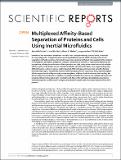| dc.contributor.author | Sarkar, Aniruddh | |
| dc.contributor.author | Hou, Han Wei | |
| dc.contributor.author | Mahan, Alison E. | |
| dc.contributor.author | Han, Jongyoon | |
| dc.contributor.author | Alter, Galit | |
| dc.date.accessioned | 2016-06-09T14:11:29Z | |
| dc.date.available | 2016-06-09T14:11:29Z | |
| dc.date.issued | 2016-03 | |
| dc.date.submitted | 2015-12 | |
| dc.identifier.issn | 2045-2322 | |
| dc.identifier.uri | http://hdl.handle.net/1721.1/103075 | |
| dc.description.abstract | Isolation of low abundance proteins or rare cells from complex mixtures, such as blood, is required for many diagnostic, therapeutic and research applications. Current affinity-based protein or cell separation methods use binary ‘bind-elute’ separations and are inefficient when applied to the isolation of multiple low-abundance proteins or cell types. We present a method for rapid and multiplexed, yet inexpensive, affinity-based isolation of both proteins and cells, using a size-coded mixture of multiple affinity-capture microbeads and an inertial microfluidic particle sorter device. In a single binding step, different targets–cells or proteins–bind to beads of different sizes, which are then sorted by flowing them through a spiral microfluidic channel. This technique performs continuous-flow, high throughput affinity-separation of milligram-scale protein samples or millions of cells in minutes after binding. We demonstrate the simultaneous isolation of multiple antibodies from serum and multiple cell types from peripheral blood mononuclear cells or whole blood. We use the technique to isolate low abundance antibodies specific to different HIV antigens and rare HIV-specific cells from blood obtained from HIV+ patients. | en_US |
| dc.description.sponsorship | United States. Defense Advanced Research Projects Agency (DARPA Dialysis-like Therapy (DLT) program under SSC Pacific N66001-11-1-4182) | en_US |
| dc.description.sponsorship | Bill & Melinda Gates Foundation | en_US |
| dc.language.iso | en_US | |
| dc.publisher | Springer Nature | en_US |
| dc.relation.isversionof | http://dx.doi.org/10.1038/srep23589 | en_US |
| dc.rights | Creative Commons Attribution | en_US |
| dc.rights.uri | http://creativecommons.org/licenses/by/4.0/ | en_US |
| dc.source | Nature Publishing Group | en_US |
| dc.title | Multiplexed Affinity-Based Separation of Proteins and Cells Using Inertial Microfluidics | en_US |
| dc.type | Article | en_US |
| dc.identifier.citation | Sarkar, Aniruddh, Han Wei Hou, Alison. E. Mahan, Jongyoon Han, and Galit Alter. “Multiplexed Affinity-Based Separation of Proteins and Cells Using Inertial Microfluidics.” Scientific Reports 6 (March 30, 2016): 23589. | en_US |
| dc.contributor.department | Massachusetts Institute of Technology. Department of Biological Engineering | en_US |
| dc.contributor.department | Massachusetts Institute of Technology. Department of Electrical Engineering and Computer Science | en_US |
| dc.contributor.department | Ragon Institute of MGH, MIT and Harvard | en_US |
| dc.contributor.mitauthor | Sarkar, Aniruddh | en_US |
| dc.contributor.mitauthor | Hou, Han Wei | en_US |
| dc.contributor.mitauthor | Mahan, Alison E. | en_US |
| dc.contributor.mitauthor | Han, Jongyoon | en_US |
| dc.contributor.mitauthor | Alter, Galit | en_US |
| dc.relation.journal | Scientific Reports | en_US |
| dc.eprint.version | Final published version | en_US |
| dc.type.uri | http://purl.org/eprint/type/JournalArticle | en_US |
| eprint.status | http://purl.org/eprint/status/PeerReviewed | en_US |
| dspace.orderedauthors | Sarkar, Aniruddh; Hou, Han Wei; Mahan, Alison. E.; Han, Jongyoon; Alter, Galit | en_US |
| dspace.embargo.terms | N | en_US |
| dc.identifier.orcid | https://orcid.org/0000-0003-1570-9445 | |
| dc.identifier.orcid | https://orcid.org/0000-0001-7215-1439 | |
| dc.identifier.orcid | https://orcid.org/0000-0003-4284-8467 | |
| mit.license | OPEN_ACCESS_POLICY | en_US |
